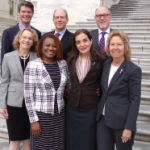The Voice of Rheumatology (VOR) Coalition convened last month at ACR Convergence 2024 in Washington, D.C., to discuss the pressing federal and state legislative priorities that will affect both the practice of rheumatology and patient care in the year ahead. The Coalition, composed of leading rheumatology professional societies and patient advocacy groups, gathered to examine critical policy issues, share insights and chart a path forward to ensure that the needs of rheumatologists, their patients and the broader healthcare community are heard and addressed at both state and federal levels.
Key Policy Areas Discussed
Several policy areas critical to the rheumatology community were discussed during the meeting. These issues not only concern the daily operations of rheumatology practices, but also have significant implications for patient access to care, treatment, innovation and reimbursement.
Utilization management reform, copay accumulator reform and pharmacy benefit manager (PBM) reform continue to be a focus. However, uncertainty surrounding whether Medicare telehealth flexibilities, currently set to expire Dec. 31, will be extended prompted more urgent discussion among the group. Since the pandemic, telehealth has been an important component of rheumatology patient care that reduces travel burden and improves access to care. Ensuring that these flexibilities stay in place is an immediate concern. Patient and provider anecdotes from recent wildfires and hurricanes shared among the group served to highlight the importance of maintaining telehealth access.
Another issue of concern is underwater biosimilars. The Average Sales Price formula used to calculate reimbursement for drugs and biologics in Medicare Part B can result in physicians being reimbursed below their purchase price for some biosimilars. The group discussed how this practice can hurt patients and providers, as well as potential solutions.
Enhancing Collaboration
To address these issues, enhanced collaboration and communication is a cornerstone of the VOR’s mission moving forward. Even though the members of the VOR share many of the same legislative priorities, each member organization conducts its own advocacy work. This approach has the benefit of providing legislators and policymakers with a variety of perspectives. However, it can also create inefficiencies, duplicative work and diminishing returns on investment.
To make the process more effective and efficient, the VOR is proposing creating a shared advocacy calendar. This will enable everyone to know when individual organizations have Hill Days and other major meetings or events on Capitol Hill.
The group is also working to create mechanisms to more easily share information from Hill Days and legislative meetings with the whole group. This will enable individual organizations to better tailor their messages to the needs and requests of specific offices. This, in turn, will lead to more engaging Hill meetings and help the rheumatology community move issues and conversations forward more efficiently by reducing or eliminating meetings that cover duplicative content.

